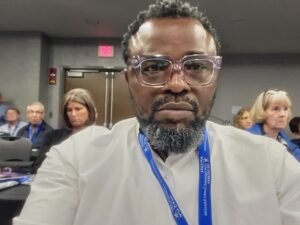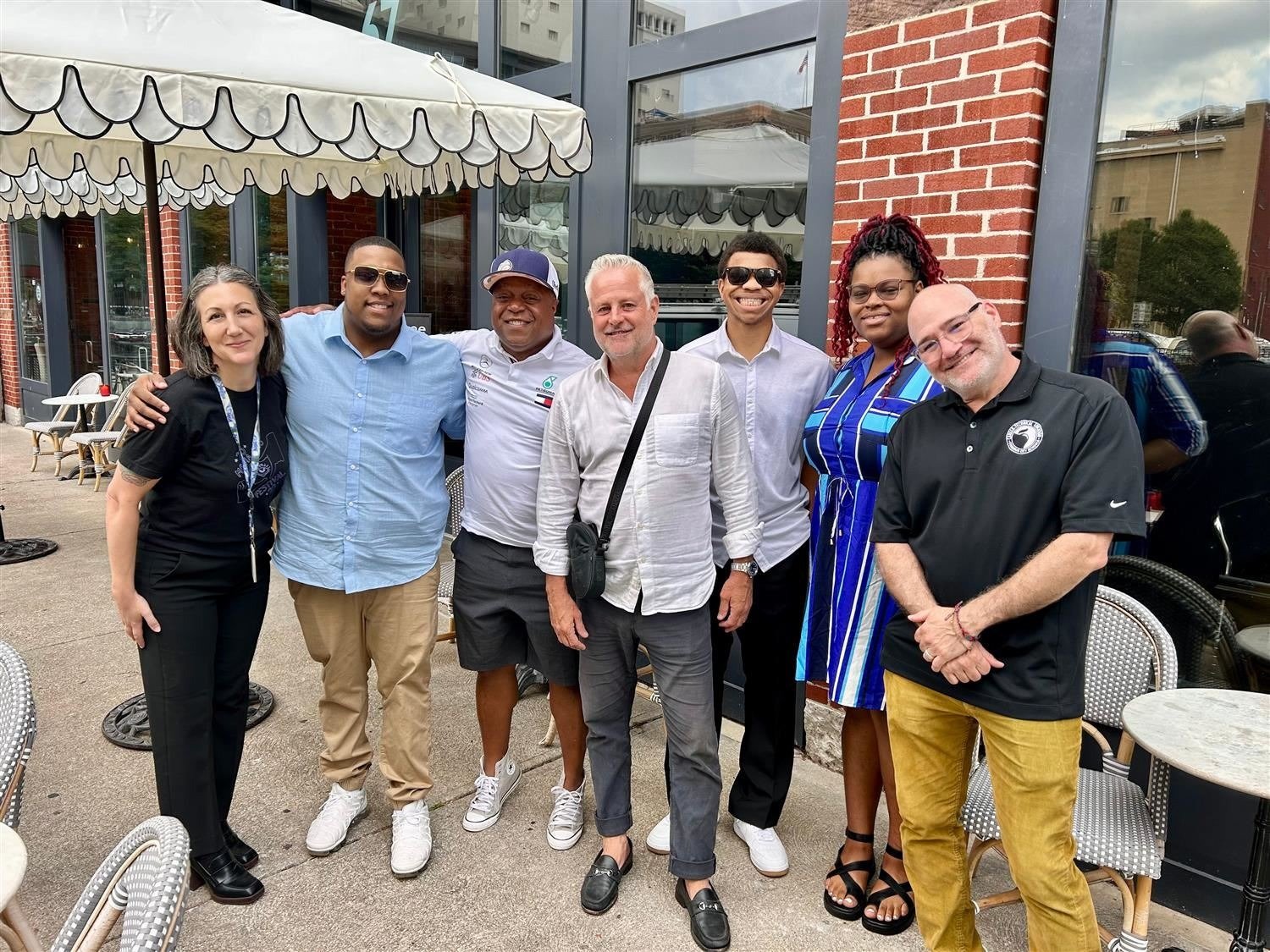Belonging Through Stories: Gaelin Elmore’s Key Anecdotes and Lessons from Day 3 of the Celebrate Kids Conference

By
Taiwo AKINLAMI
Here’s a session focusing on the main anecdotes and quotes from Gaelin Elmore’s presentation, supplementing the overall coverage of his powerful message on the importance of belonging. These key moments and quotes from his talk bring out the emotion and wisdom he shared during the 29th Annual Celebrate Kids Conference of the Ohio CASA/GAL Association.
Main Anecdotes and Quotes from Gaelin Elmore’s Presentation:
- The Broccoli Story: A Childhood Memory of Belonging
One of the earliest anecdotes Elmore shared was a lighthearted but significant memory about broccoli, a food he hated as a child. His daycare forced him to eat it, threatening to deny him recess if he didn’t comply. After being forced to eat it and subsequently vomiting, his mother was called to pick him up. What makes this story impactful is not the broccoli itself, but the way his mother fiercely defended him, advocating for him in a way that made him feel loved, valued, and protected.
Quote: “That was my favorite childhood memory—not because of the broccoli, but because in that moment, I felt I belonged. My mother advocated for me, fiercely and without hesitation. I knew no matter what happened, she would be there, fighting for me.”
- Oversleeping and Walking to School: The Day the Police Were Called
Elmore’s story about the time he overslept and walked to school instead of taking the bus offers a stark contrast between his internal peace and the chaos his absence caused at the school. His teacher, deeply concerned for his safety, called the police after he didn’t arrive on time, fearing something terrible had happened. Elmore arrived, oblivious to the situation, but was moved by the concern his absence had generated. For a boy who had grown accustomed to feeling invisible, this was a revelation.
Quote: “Walking to school that day felt like an adventure. I was sweating, dehydrated, and I even stopped for a drink at a gas station, not realizing that my school was in chaos because of me. When I arrived and saw the teachers, some crying, some relieved, I realized for the first time in a long time—I mattered. I was important to them.”
- The Impact of Miss Peanut: A Janitor Who Changed His Life
Elmore recalled the influence of Miss Peanut, the janitor at his elementary school, who was one of the few adults who saw and supported him without judgment. Miss Peanut was an authentic and caring figure who would allow him to help with tasks around the school, giving him a sense of purpose and connection. She even stepped in during lunch when he was spiraling emotionally and silently replaced his tray of broccoli with something else, knowing his triggers without him having to say a word.
Quote: “Miss Peanut didn’t need a degree or a fancy title to make an impact. She was one of the realest people I ever met. She knew when I wasn’t myself, and she didn’t need me to explain why. She just showed up. She showed me what authenticity really means—being there when it matters, no matter how small the gesture.”

- His High School Coach: Offering a Place to Belong
One of the most significant moments in Elmore’s life was when his high school football coach offered him a place to live after he decided to drop out of school. Initially, Elmore was skeptical, unable to trust that this coach was different from the many adults who had let him down before. However, his coach’s resilience, persistence, and genuine offer of help led Elmore to eventually accept the invitation, which changed the course of his life.
Quote: “He didn’t just offer me a place to stay—he offered me a place to belong. He didn’t chase me or force me into anything; he followed through, even when I laughed in his face. His resilience was unwavering, and for the first time, I felt like someone truly saw me and wasn’t going to give up on me.”
- The Moment with His Father in Court: A Defining Family Fracture
Elmore shared a poignant moment in court when his parents’ rights were terminated, and his mother testified against his father. This was a heartbreaking turning point in his life. Despite the family’s fracture, Elmore’s father continued to fight for him, ultimately showing him that belonging, while sometimes broken, can still be powerful when someone doesn’t give up on you.
Quote: “I couldn’t look my father in the eye that day in court. It felt like the end of everything I knew, but my father said something that stayed with me. He told me, ‘Today is not the day. There will come a time when I can’t take you any further, but that day is not today.’ He kept fighting for me, even when I thought all was lost.”
- Resilience and Empowerment: Lessons from His Coach
Elmore spoke about how his coach not only supported him but empowered him and even built a relationship with his incarcerated father. This act of empowerment allowed Elmore to see a path forward in his life, one that didn’t rely solely on the adults currently present but included those who had always been in his life, like his father.
Quote: “Resilience is not just about surviving—it’s about thriving. My coach didn’t just help me; he empowered my father. He didn’t have to do that, but by doing so, he gave me something I didn’t even know I needed—hope for my family.”

- Empowering Others: A Key to Advocacy
Elmore underscored the importance of empowerment in advocacy, not just for the children but for the families and communities surrounding them. He shared how his coach’s support of his father gave him strength, allowing him to navigate difficult circumstances with more resilience.
Quote: “Empowerment is about preparing someone for a future where you may no longer be present. My coach empowered me, yes, but he also empowered my father—giving him the tools to continue supporting me even when he couldn’t be physically present. That’s the true power of advocacy.”
- Belonging: The Difference Between Surviving and Thriving
Elmore’s entire speech revolved around the concept of belonging and how it shaped his life. He explained how belonging acts as a safety net, a parachute, or a seatbelt, helping to soften the blows of life’s hardships. Without belonging, adversity can have long-lasting negative effects, but with it, there is always hope.
Quote: “Belonging doesn’t remove the adversity from your life, but it cushions the fall. It’s the safety net that catches you when life knocks you down, the parachute that slows the freefall, the seatbelt that minimizes the crash. Belonging is the difference between merely surviving and truly thriving.”

Conclusion: Gaelin Elmore’s Message in Quotes
Throughout his presentation, Gaelin Elmore delivered deeply moving stories and quotes that emphasized the critical importance of belonging in the lives of vulnerable children. From the fierce advocacy of his mother over a plate of broccoli to the unrelenting support of his high school coach, Elmore’s anecdotes painted a vivid picture of how belonging shapes our sense of self, our decisions, and ultimately, our future.
His message was clear: Belonging is a fundamental need, and advocates have the power to change lives by ensuring that the children they serve feel valued, important, and safe.
As Elmore’s final quote illustrates, “People change when they receive enough—enough love, enough care, enough support. And that’s what we are here to do: give them enough, so they can change, grow, and thrive.”
These stories and quotes form the emotional backbone of Elmore’s keynote, reinforcing his central theme that belonging is the key to unlocking the potential in every child.

Taiwo AKINLAMI is the Curator-in-Chief of the S.A.F.E for Children® Information Bank, Ohio, a Project of Power Parenting Company LLC (http://www.powerparentingcompany.com/)





